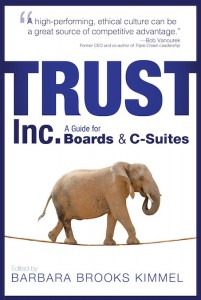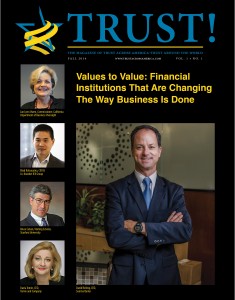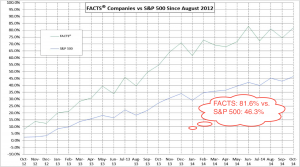As the co-founder and Director of Trust Across America – Trust Around the World, I’ve been studying organizational trust (and trustworthiness) for the best part of seven years, have spoken to hundreds of global experts, and read thousands of articles, blog posts and books. I’ve also edited and contributed to three books in our TRUST Inc. series, publish a magazine called TRUST!, and regularly attend and speak at conferences. Some might call me an expert, but nothing could be farther from the truth. In fact, the more I learn about trust and trustworthiness, the less I understand it.
If you are like me, it’s almost impossible to go a full week without the news covering another major trust violation. Last week it was Hillary’s turn, before that Bill O’Reilly following on the heels of Brian Williams, and so on. These stories come and go and the American public has come to accept them as the norm. In fact, with each violation, the shock factor seems to diminish.
The following are ten observations I have made about trust & trustworthiness in American society:
- Because there is no universally accepted definition of trust, your definition of trust and your standards of trustworthiness are different than mine. In fact, even prisoners think they are more trustworthy than the general population. Some of the self-proclaimed trust and leadership experts I have met are the least trustworthy upon close and careful inspection of their character, competence and consistency, yet they believe they are in a position to advise others.
- As family “time” has eroded over the past generation, the moral compass that, in the past guided future generations (parenting) has all but disappeared. Compound this with the “win at all costs” mentality promoted by coaches on athletic fields across America and future generations may not be empowered with the right tools or behavior.
- America’s entire public educational system is based on “grades” not learning, and cheating and grade inflation have become an accepted norm in schools and universities. Parents “game” the system by having their children classified as “math anxious or test frightened” so they are allotted extra time on tests to boost that all important GPA, and Athletes have it the best. In other words, parents are not helping their children to grow up to be trustworthy adults.
- Government officials, beginning with our local community leaders place their political agendas before the betterment of the constituents who elected them, and this obliterates the opportunity to build community trust. Our elected officials believe that if they don’t violate any laws, they are trustworthy. Americans are very forgiving of trust violations and even outright lies. In fact they overlook them.
- Same goes for corporate America. Our “win at all cost” athletes and students are considered to be the “best in class” and are recruited by major companies. There’s no “moral compass litmus test” administered before the job offer. Similar to our government leaders, corporate leaders also believe that as long as they stay “just to the right” of compliance, and grow their quarterly earnings, there is no need to give a second thought to cultivating a trustworthy organization or hiring for the “right” reasons. Stock buybacks, executive compensation and short-termism are all trust busters.
- Boards of directors don’t understand the role of organizational trust any better than the leaders they select. One need look no further than the composition of most Boards to appreciate and understand this.
- Trust CANNOT be regulated yet many think it can. As my colleague Alain Bolea at Business Advisors Network commented in a recent article:
Rules are often put in place to curtail the abuses of the past. A “leader” that is only guided by compliance begs the question: What would their behavior be in the absence of rules? Does one want to follow someone that needs rules to know what is right? Or are true leaders to inspire trust by staying clear of conflicts of interest and abuses of power.
- The word “trust” is so overused and misused that it is no longer sacred. The media throws around the word “trust” as if it were a headline hot potato. Frequently, journalists and writers confuse trust with regulation, loyalty and ethics. But the word “trust” is a better sound byte, so why not misuse it?
- And speaking of the media, they continue to perpetuate low trust by focusing only on the bad actors, giving no “space” to those who are doing the right thing.
- I frequently talk about trust with leaders of organizations of different shapes and sizes. Not only do they not “get it” they have little interest in learning. They believe trust is all about falling into someone’s arms and hoping they catch you. Instead of embracing trust as a business strategy, leaders hold their collective breaths hoping they are not the subject of the next news headline.
Is there a silver lining to this bleak picture? Yes, because some families still gather around the dinner table every night and not every child is a cheater. There will always be the Bobby Knights vs. the Mike Krzyzewskis, and the first day of work for a new hire at Zappos may be very different than the first day at JP Morgan. In other words, industry is not destiny. Like most things in life, trustworthy people and organizations line up along a bell curve. Half are below average, but half are above average, and a select few find themselves all the way to the right. They are the heroes and stars that should be making the headlines.
Just the other day, someone told me that Trust Across America – Trust Around the World is making a difference. I suppose the growth of our Alliance proves that we are moving in the right direction. But a gnawing fear remains. Trust is not only misunderstood, overlooked or taken for granted by most people, leaders and organizations, it’s also voluntary. And, after all, why give a second thought to that which is not regulated, at least not in America?
Barbara Brooks Kimmel is the Executive Director of Trust Across America-Trust Around the World whose mission is to help organizations build trust. She runs the world’s largest membership program for those interested in learning more, and is also the editor of the award winning TRUST INC. book series and the Executive Editor of TRUST! Magazine. In 2012 Barbara was named “One of 25 Women Changing the World” by Good Business International.
Our 2015 Poster, 52 Weeks of Activities to Increase Organizational Trust is available to those who would like to support our work by making a small donation.
Copyright 2015, Next Decade, Inc.









Recent Comments